ChangeThis
The original idea behind ChangeThis came from Seth Godin, and was built in the summer of 2004 by Amit Gupta, Catherine Hickey, Noah Weiss, Phoebe Espiritu, and Michelle Sriwongtong. In the summer of 2005, ChangeThis was turned over to 800-CEO-READ. In addition to selling and writing about books, they kept ChangeThis up and running as a standalone website for 14 years. In 2019, 800-CEO-READ became Porchlight, and we pulled ChangeThis together with the rest of our editorial content under the website you see now. We remain committed to the high-design quality and independent spirit of the original team that brought ChangeThis into the world.
-
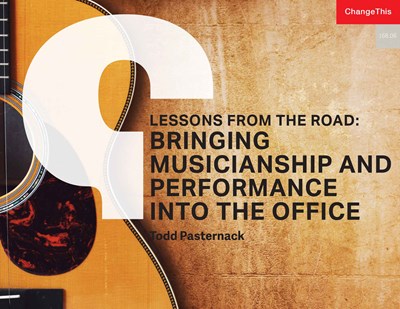
Blog / ChangeThis
Lessons From The Road: Bringing Musicianship and Performing Into The Office
By Todd Pasternack
"We often look towards established business leaders when seeking out new ideas to inspire us. Their advice and stories re-energize us, bringing the hope of discovering a greater awareness of where our careers can evolve to, or how our businesses can operate with fresh approaches to drive growth. We dig to uncover nuggets of wisdom from these well-known leaders to embrace and adopt into our everyday lives. But perhaps there's an unexpected type of leader to draw inspiration from. Have you ever looked at the way bands and music artists operate—at various levels of success—and found parallels to the ways that businesses need to constantly innovate, grow and empower their teams to get the best out of them. Or how the power of listening can open up new and unexpected opportunities. As a former professional musician turned technology executive, I've seen and lived these parallels between the stage and office and put them into practice. There are more connections than you may think.
Categories: changethis
-
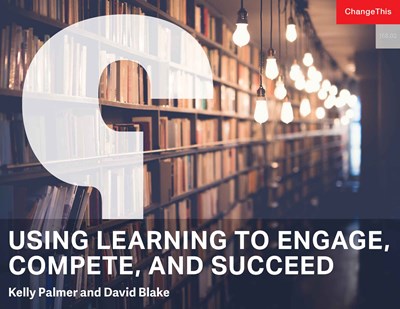
Blog / ChangeThis
Using Learning to Engage, Compete, and Succeed
By Kelly Palmer, David Blake
"The world of work is going through a large-scale transition—much like the transition we went through from the agricultural economy to the Industrial Revolution. We are now in the age of digitization, automation, and acceleration—an age where critical skills and expertise will be an imperative for us to succeed in the economy. [...] If you aren't ready and willing to learn every day and keep up with a rapidly changing world, you can't and won't stay competitive. Gone are the days when you could graduate with a four-year degree and feel secure that you had learned everything you needed to know to stay relevant for your entire career."
Categories: changethis
-
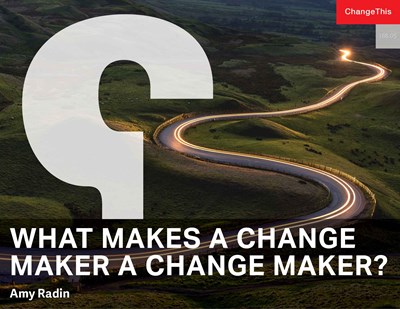
Blog / ChangeThis
What Makes a Change Maker a Change Maker?
By Amy Radin
"Innovation has moved from a distant abstraction in the business world to a front-and-center deliverable that is expected to show evidence of impact. But there is no guaranteed formula for finding ideas and executing on them for sustained impact. Users and buyers set moving expectations, investors are demanding and unforgiving, and society expects companies to contribute beyond the bottom line. Change makers operate within the polarities of innovation—innovation is cool yet threatening, inevitable yet unpredictable, attractive yet avoided—and remain undeterred. They want to solve real problems by getting stuff done, even with the uncertainty, unpredictability, and ambiguity that defines their journey. They are guided by purpose, and are driven to create value benefiting investors and employees, users, buyers, partners, and the broader community in which they exist. They don't accept the status quo. They operate with urgency, and speed their progress by rolling up their sleeves and learning on the fly.
Categories: changethis
-
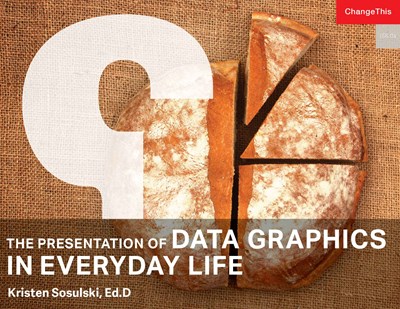
Blog / ChangeThis
The Presentation of Data Graphics In Everyday Life
By Kristen Sosulski
"Consider how our smartphones, social media platforms, or even search engines alter the pace, pattern, and scale of our daily activities. Think about your own process for selecting restaurants, documenting moments, and sharing your thoughts with others and the role that your media plays in these activities. Next, consider pictorial representations of data, or data graphics as a medium. How have data graphics proliferated their presence in our everyday life. Navigation systems guide us from one location to another through narrated directions accompanied by digital maps, annotated with points of interests like the nearest coffee shops, shoe stores, or art museums as alternative pathways to peak our interest and reroute us from our original destination. Aside from navigation aids, data graphics accompany news reports, research findings, and advertisements as both supporting evidence and alternative narratives. [. . . ] [. . . ] When used with integrity and purpose, data graphics have the potential to help us, as humans, make sense of this intensely data focused world.
Categories: changethis
-
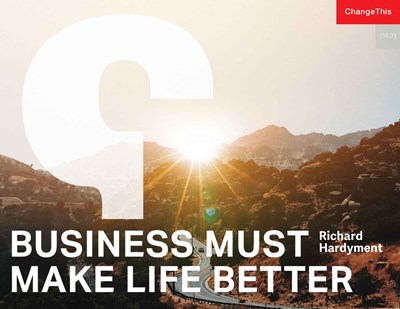
Blog / ChangeThis
Business Must Make Life Better
By Richard Hardyment
"Big business today is under scrutiny like never before. Trust is flaky. Consumers are cynical. Many companies talk about playing a role in society—through philanthropic giving and environmentally sustainable practices. But few have defined their ambitions for life. Companies have a phenomenal impact on how people feel—our wellbeing. Yet there has been a deafening silence from the private sector about the central purpose of human existence. In our turbulent world of change, we desperately need a more human form of capitalism that places people at its heart—whether that's farmers supplying raw materials, factory workers creating goods, or shoppers buying and consuming products and services. We need business to embrace a wellbeing purpose with an audacious ambition: to make life feel better."
Categories: changethis
-

Blog / ChangeThis
Prepare for Your Lucky Break
By Randy Komisar
"A long career in business has impressed upon me the unpredictability of success. As an entrepreneur and investor this lesson is particularly sobering. When I started, I felt that my hard work and a modicum of intelligence would propel me to certain success. Simply put one foot in front of the other. But living in the Silicon Valley casino has changed my view. Success is, after all, relative. There is much written about the short half-life of the joy experienced after receiving a significant windfall if others have received an even greater sum. It seems we can't even gauge our own success without comparison to others. And in Silicon Valley, the relative distribution of success appears largely random. That is not to say that many of the successful icons of innovation aren't impressive; it's to say that in comparison to so many of the also-rans they are virtually indistinguishable. And that realization alone is humbling."
Categories: changethis
-
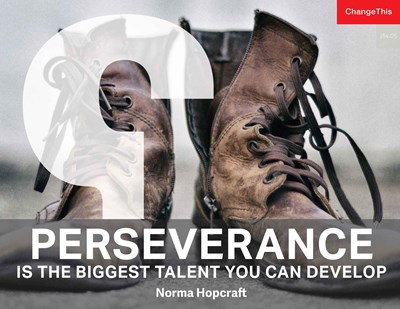
Blog / ChangeThis
Perseverance Is the Biggest Talent
By Norma Hopcraft
"After losing my way in life, just a bit, I re-launched a writing career—a childhood dream—and began to send work to literary magazines. I was bursting with hope for affirmation of my great skill and broad experience. Editors would be glad I sent them work. I would be a literary star. I sent out stories and essays confidently at first. Months later I would get a reply in the mail—from The Paris Review, for example (I'm a sucker for the biggest names). I would stand motionless, desperate for acceptance, floating amongst the stars with hope. I'd slip my finger under a loose corner of the flap and tear. Take the slip of paper and hold it up to my near-sighted eyes. The pain of rejection dragged me from the stars into the red-hot magma at the core of the earth. I'd get a letter from a lit magazine and cringe at the pain I was about to feel. I would try to cut off hope—it seemed easier than to be disappointed again. Then I'd hope against hope, wishing for that surge of affirmation from being accepted.
Categories: changethis
-
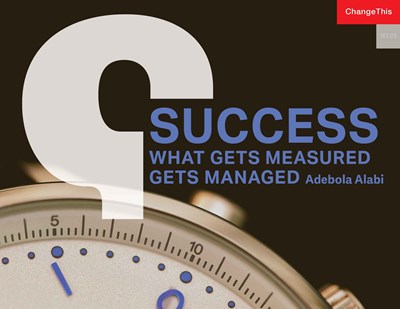
Blog / ChangeThis
Success: What Gets Measured Gets Managed
By Adebola Alabi
"Don't we all desire to be winners in our various field of endeavor? Wouldn't you want to stand tall and get ovation from your friends and loved ones after achieving a feat? Everyone desires to win in life; we all want to be successful in everything we do. It is no secret that everyone, whether young or old wants to be champions and achieve success in whatever they do. People want to excel in sports, academics, business, career, finances, health, relationships, and in spiritual life. Why do some succeed, while others failed, why are some so far behind in the game of life while others are well ahead? Why does it seem like everything goes very well for some while others appear to be struggling in everything they do? What does it take to become a champion? Can anyone win in the game of life and become as successful as they desire?"
Categories: changethis
-
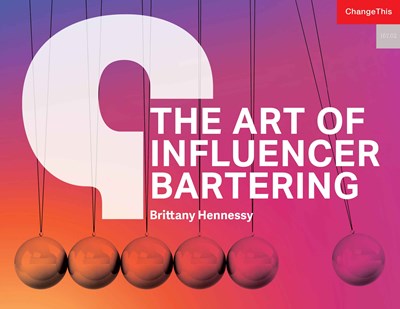
Blog / ChangeThis
The Art of Influencer Bartering
By Brittany Hennessy
"It may seem like everyone has a blog, or a social channel they want you to follow, and that's because it's true. It has never been easier to turn your expertise into a revenue stream and becoming an influencer will help you do just that. Let's start with the most important questions: What exactly are influencers and why are they important. In general, an influencer is someone who has influence. I know, I know, it isn't very helpful to define a word by using the same word, but sometimes things really are that simple. Word-of-mouth marketing is nothing new and it's probably the driving force behind most of your consumer habits, whether that's buying a product, binge-watching a show, or downloading an app. But in today's digital world, the word 'influencer' is most commonly ascribed to someone who has clout through her digital channels, or as some like to call it, 'social currency. ' Whether she has a lot of followers or really high engagement, when she speaks, her audience listens, they act, and—most importantly to brands—they buy.
Categories: changethis
-
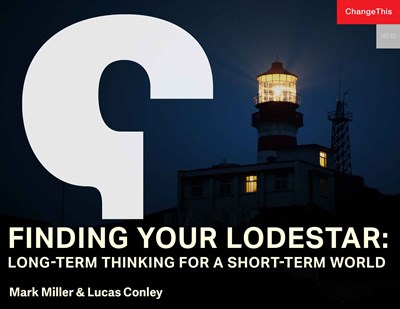
Blog / ChangeThis
Finding Your Lodestar: Long-Term Thinking for a Short-Term World
By Mark Miller, Lucas Conley
"In 1968, Andy Warhol proclaimed, 'In the future, everyone will be world-famous for 15 minutes. ' With the advent of memes and viral videos, we now live in that future—one in which any trending joe (or his grumpy cat) can make a quick buck. So why is all this short-termism leaving so many of us feeling shortchanged. We now live an increasingly short-term world, one where the products we buy often outlive the brands that make them. It's not just the inherently trendy brands. All brands are equally susceptible to the traps of short-term thinking. In the face of change, short-term thinkers see a fork in the road—choosing to either cling to what worked in the past or abandon it in an effort to reclaim the spotlight. Therein lies the key difference we at The Legacy Lab have observed between short-term thinkers and their long-term counterparts: The former focus only on their immediate circumstances—their 15 minutes of fame. The latter aspire to a lifetime of significance. ".
Categories: changethis

